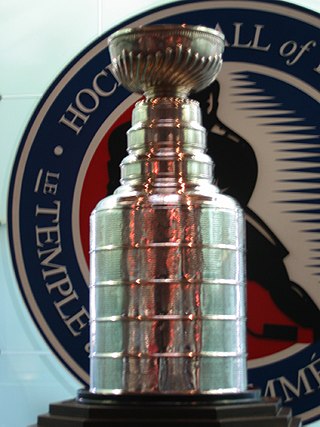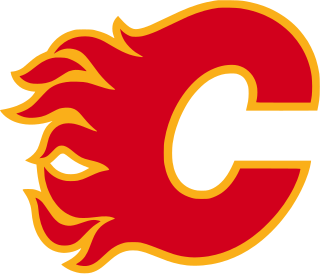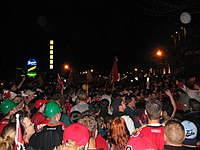
Martin Gélinas is a Canadian former professional ice hockey forward who played 1,273 games in the National Hockey League (NHL) for the Edmonton Oilers, Quebec Nordiques, Vancouver Canucks, Carolina Hurricanes, Calgary Flames, Florida Panthers and Nashville Predators. A first round selection of the Los Angeles Kings at the 1988 NHL Entry Draft, Gélinas was sent to the Oilers as part of the 1988 Wayne Gretzky trade before ever playing a game for the Kings.

Scotiabank Saddledome is a multi-use indoor arena in Calgary, Alberta, Canada. Located in Stampede Park in the southeast end of downtown Calgary, the Saddledome was built in 1983 to replace the Stampede Corral as the home of the Calgary Flames of the National Hockey League, and to host ice hockey and figure skating at the 1988 Winter Olympics.

Michael Vernon is a Canadian former professional ice hockey goaltender who played 19 seasons in the National Hockey League (NHL) for the Calgary Flames, Detroit Red Wings, San Jose Sharks and Florida Panthers.
The 1982–83 NHL season was the 66th season of the National Hockey League. The New York Islanders won their fourth Stanley Cup in a row with their second consecutive finals sweep by beating the Edmonton Oilers four games to none. No team in any major professional North American sport has won four consecutive playoff championships since.
The history of ice hockey in Calgary extends back well over a century to the first recorded ice hockey game in Alberta in 1893. Imported from eastern Canada, the game's popularity rapidly grew in the city, with teams at every level playing for and capturing Canada's national championships. Calgary is known today as one of Canada's best ice hockey cities with the Calgary Flames and Calgary Hitmen receiving immense support from the city. The Calgary Oval X-Treme is one of the most dominant women's ice hockey teams in the country, while Junior A ice hockey is also well supported with two teams in the city. Calgary is home to the Mac's AAA midget hockey tournament, one of the most prestigious midget hockey tournaments in the world which has seen dozens of future National Hockey League players play in this city before their professional careers began.

The 2003–04 Calgary Flames season was the 24th National Hockey League season in Calgary, and the 32nd for the franchise in the NHL. The Flames ended a seven-year playoff drought, qualifying for the post-season for the first time since 1996. The Flames defeated three division winners en route to an appearance in the 2004 Stanley Cup Finals. The Flames were defeated in the finals by the Tampa Bay Lightning in seven games. The run to the finals captured the imagination of the city, while the Red Mile celebrations gained international attention for the "Mardi Gras-like" atmosphere as up to 80,000 people celebrated in the streets after each playoff game.

The 2006–07 Calgary Flames season began with a great deal of promise following the acquisition of top forward Alex Tanguay from the Colorado Avalanche. The other major off-season news was that Darryl Sutter promoted his assistant coach, Jim Playfair, to head coach as Sutter stayed with the team as general manager only.
The 1993–94 Calgary Flames season was the 14th National Hockey League season in Calgary. It was a season of change across the NHL, as the league reorganized its divisions and playoff format. The Smythe Division was retired and the Flames joined the new Pacific Division of the Western Conference, as the NHL aligned itself with the other major sports leagues in naming divisions by geographical boundaries. The change angered fans, who preferred the traditional convention, which honoured the game's past builders.

The 2004 Stanley Cup Finals was the championship series of the National Hockey League's (NHL) 2003–04 season, and the culmination of the 2004 Stanley Cup playoffs. The Eastern Conference champion Tampa Bay Lightning defeated the Western Conference champion Calgary Flames in seven games, becoming the southernmost team to win the Stanley Cup. It was Tampa Bay's first-ever appearance in the final. For Calgary, it was the team's third appearance, and first since their championship season of 1989. Lightning owner William Davidson would soon become the first owner in sports history to win two championships in one year as eight days later, the other team that Davidson owned won the NBA title in five games over the Los Angeles Lakers. This was the last Stanley Cup Finals played for two years, as the 2004–05 NHL lockout began three months after the end of this final, lasting over ten months and leading to the cancellation of the 2005 Final, with the league not returning to play for the Cup until 2006. This was the last of three consecutive Finals to feature a team making its debut appearance.
The 1985–86 Calgary Flames season was the sixth season in Calgary and 14th for the Flames franchise in the National Hockey League (NHL). It was a banner season for the Flames, who overcame a franchise record eleven game losing streak to finish 2nd in the Smythe Division and captured the franchise's first Clarence S. Campbell Bowl as Campbell Conference champions. In doing so, they became the first Calgary team to reach the Stanley Cup Finals since the Calgary Tigers in 1923–24. The Flames season ended at the hands of the Montreal Canadiens, who defeated Calgary in five games in the final.
The 1988–89 Vancouver Canucks season saw the Canucks finish in fourth place in the Smythe Division with a record of 33 wins, 39 losses, and 8 ties for 74 points. They met the first-place Calgary Flames in the Division Semi-finals and extended the series to a decisive seventh game. However, the Flames took the game and the series on a Joel Otto goal in overtime en route to a Stanley Cup championship.

The 1983–84 Calgary Flames season was the fourth season in Calgary and 12th for the Flames franchise in the National Hockey League. The Flames finished in second place in the Smythe Division, earning a first round playoff match-up against the Vancouver Canucks. Calgary defeated Vancouver in four games to face the top team in the NHL, the Edmonton Oilers. The Flames took the series to the maximum seven games, ultimately falling to the Oilers in the seventh game by a 7–4 score.

The 1989 Stanley Cup playoffs, the playoff tournament of the National Hockey League (NHL) began on April 5, after the conclusion of the 1988–89 NHL season. This was the final year that all of the Division Semifinals began with teams playing the first four games in a span of five days. The playoffs concluded on May 25 with the champion Calgary Flames defeating the Montreal Canadiens 4–2 to win the Stanley Cup Finals four games to two.

The Calgary Flames are a professional ice hockey team based in Calgary. The Flames compete in the National Hockey League (NHL) as a member of the Pacific Division in the Western Conference, and are the third major professional ice hockey team to represent the city of Calgary, following the Calgary Tigers (1921–1927) and Calgary Cowboys (1975–1977). The Flames are one of two NHL franchises based in Alberta, the other being the Edmonton Oilers. The cities' proximity has led to a rivalry known as the "Battle of Alberta".
17 Avenue SW is a major east–west arterial road in the southwest quadrant of the city of Calgary, Alberta.
The 2010–11 NHL season was the 94th season of operation of the National Hockey League (NHL). The Boston Bruins defeated the Vancouver Canucks in the Stanley Cup Finals four games to three, being the sixth Cup win in Bruins' franchise history. For the fourth consecutive season, the season started with games in Europe. The 58th All-Star Game was held at RBC Center in Raleigh, North Carolina, home arena of the Carolina Hurricanes, on January 30, 2011.

The Canucks–Flames rivalry is a rivalry that takes place in the Pacific Division of the National Hockey League between the Vancouver Canucks and the Calgary Flames. The Vancouver Canucks started play in the 1970–71 season as an expansion team and the Calgary Flames started play during the 1980–81 season as a relocated team from Atlanta. This rivalry is notable in that both teams have played each other in three overtime game sevens in the playoffs, second only in the NHL to the St. Louis Blues and Minnesota North Stars/Dallas Stars.
The 2013–2014 Calgary Flames season was the 34th season in City of Calgary and 42nd for the Flames franchise in the National Hockey League (NHL). It was the first season of a rebuilding phase, and the first full year following the departure of long-time captain Jarome Iginla and goaltender Miikka Kiprusoff. Mark Giordano replaced Iginla as team captain. The Flames also began the year in a new division as they returned to the Pacific Division following a league-wide realignment. Change continued into the playing season as new team president Brian Burke fired general manager Jay Feaster on December 12, 2013, and assumed the role himself on an interim basis.
The 2014–15 Calgary Flames season was the 35th season in Calgary and 43rd for the Flames franchise in the National Hockey League (NHL). Entering the second year of a rebuilding phase, the Flames began the season with low expectations as nearly every pundit predicted the team would finish near the bottom of the League standings. Instead, however, the Flames proved to be one of the surprise stories of the 2014–15 NHL season by finishing third in the Pacific Division with a record of 45–30–7 and qualified for the 2015 Stanley Cup playoffs; it was the team's first playoff appearance since 2009.










